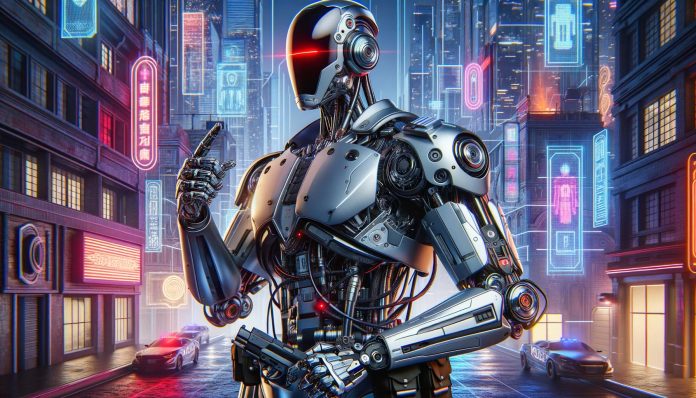As a movie and tech enthusiast, I have always been fascinated by the intersection of AI and human experience. One of the most iconic franchises that explores this theme is the Robocop series. From its gritty beginnings in the late ’80s to its modern reinterpretations. The RoboCop movies have captured the imagination of audiences by examining the implications of AI in law enforcement and society.
The Original RoboCop (1987)
The first installment of the Robocop series was released in 1987, directed by Paul Verhoeven. Set in a dystopian Detroit, the movie introduces us to Alex Murphy. A dedicated police officer who becomes a victim of violent crime. After his brutal murder, Murphy is resurrected as a cyborg law enforcer, known as RoboCop.
Themes of AI and Humanity
The original film delves deep into the ethical dilemmas surrounding AI and robotics. It raises questions about identity, autonomy, and the consequences of merging man with machine. As RoboCop grapples with his lost humanity and programmed directives, viewers are left to ponder the nature of consciousness and free will.
Cultural Impact
Robocop didn’t just entertain; it also sparked discussions about corporate greed, privatization, and the militarization of law enforcement. The movie’s satirical take on these issues resonated with audiences, making it a reflection of the societal anxieties of the time. It became a cult classic and set the stage for future explorations of AI in cinema.
RoboCop 2 (1990)
Following the success of the original, RoboCop 2 was released in 1990. Directed by Irvin Kershner, this sequel continued the story of our cyborg hero while introducing new challenges and adversaries.
The Evolution of AI
In this sequel, we see the introduction of a new, more advanced AI system, Robocop 2, which raises the stakes and presents a formidable opponent to our protagonist. The film explores the dangers of unchecked AI development and the potential for machines to operate beyond human control.
Reception and Critique
While RoboCop 2 offered thrilling action and intriguing developments, it received mixed reviews. Some critics felt it lacked the sharp social commentary of its predecessor, focusing more on action than on the philosophical questions about AI and ethics. However, it still managed to entertain and expand the Robocop universe.
RoboCop 3 (1993)
The third installment, Robocop 3, directed by Fred Dekker, took a different approach. Released in the early ’90s, this film was aimed at a younger audience, which led to a shift in tone and style.
A Shift in Tone
Robocop 3 features Robocop fighting against a corporation that seeks to control the city of Detroit, aligning with the film’s themes of corporate power and resistance. However, the film’s lighter tone and PG-13 rating resulted in a more family-friendly approach, which alienated some fans of the original film.
The Legacy of Robocop 3
Despite its flaws, Robocop 3 introduced new elements to the franchise, such as the character of Ninja Robocop. It also showcased the ongoing societal issues of the time, such as gentrification and corporate exploitation. However, many fans considered it a step down from the previous films.
RoboCop Reboot (2014)
After a long hiatus, the RoboCop franchise was rebooted in 2014, directed by José Padilha. This modern adaptation brought the character into the 21st century, reflecting contemporary concerns about technology and surveillance.
Modern Themes
The 2014 reboot updated the original story to address modern issues surrounding AI and surveillance. The film explores questions about drone warfare, privacy, and the ethical implications of AI in policing. The character of Alex Murphy is once again portrayed as a tragic hero, grappling with the loss of his humanity.
Reception and Criticism
While the reboot was praised for its visual effects and action sequences, it was criticized for lacking the satirical edge that made the original film so impactful. Many fans were divided over the updated portrayal of Robocop, with some feeling that it strayed too far from the essence of the character.
The Impact of RoboCop on AI Discourse
Throughout the Robocop series, the depiction of AI has sparked important conversations about the role of technology in our lives. The films serve as a cautionary tale about the potential consequences of allowing machines to take control of human functions, particularly in areas such as law enforcement and public safety.
AI and Society
As we continue to advance in AI technology, the themes presented in the Robocop series remain relevant. The conversations about ethics, accountability, and the implications of AI on society are more pressing than ever. Movies like this encourage us to critically examine these issues. Making them essential viewing for anyone interested in the future of technology.
Conclusion
The Robocop series stands as a significant contribution to the discourse surrounding AI and its impact on humanity. From the original movie’s biting social commentary to the more modern interpretations. The franchise has evolved while remaining grounded in its core themes.
As we move forward in an age dominated by technology. The lessons from the Robocop series remind us of the importance of maintaining our humanity in the face of rapid advancements. Whether you’re a long-time fan or new to the franchise, the Robocop movies offer a compelling exploration of the relationship between man and machine, making them worthy of our attention.
Final Thoughts
In a world where AI is becoming increasingly integrated into our daily lives. Revisiting the RoboCop series not only provides entertainment but also serves as a critical reflection on the path we are on. As we continue to optimize our understanding of technology, films like Robocop remind us to consider the ethical implications of our creations.
<iframe width="560" height="315" src="https://www.youtube.com/embed/h96IdEwITY4?si=-5_VsxZ1p18j0VNd" title="YouTube video player" frameborder="0" allow="accelerometer; autoplay; clipboard-write; encrypted-media; gyroscope; picture-in-picture; web-share" referrerpolicy="strict-origin-when-cross-origin" allowfullscreen></iframe>




.jpg?w=100&resize=100,70&ssl=1)
